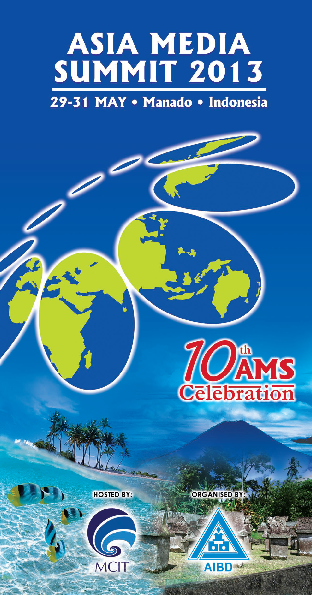James Cridland, radio futurologist and CEO of Media UK, says the future of radio will not rely on the strength of best music mix, but on human connection and shared experience. As radio continues to grow in digital platform such as DAB+, “it will offer more channels and more choices; it will become more popular and its future assured,” he said.
James Cridland, radio futurologist and CEO of Media UK, says the future of radio will not rely on the strength of best music mix, but on human connection and shared experience. As radio continues to grow in digital platform such as DAB+, “it will offer more channels and more choices; it will become more popular and its future assured,” he said.
Mr. Cridland spoke at the Workshop on the Challenges for Radio in the Digital Age, which was held on 28 May 2013 as a pre-summit event of the Asia Media Summit in Manado, Indonesia.
In his speech, Mr. Cridland said that radio’s strength makes it a great delivery platform for messages and news. However, this medium needs to deal with the young audience who is listening less to radio.
During her welcome remarks, Dra. Rosarita Niken Widiastuti, President of AIBD General Conference and Director of Radio Republik Indonesia (RRI), encouraged radio broadcasters to tap digital technology in offering good content.
AIBD Director Yang Binyuan also delivered a message saying radio is coming back strong with digital technology. This becomes important in Asia Pacific where radio plays a critical role in society.
He thanked AIBD partners in supporting this radio workshop, which has not been given much attention in previous AMS activities. They are Radiodays Europe, French Government, RFI and France 24.
A Strong Future for Radio
James Cridland, radio futurologist and CEO of Media UK, says the future of radio will not rely on the strength of best music mix, but on human connection and shared experience. As radio continues to grow in digital platform such as DAB+, "it will offer more channels and more choices; it will become more popular and its future assured," he said.
Pluralism in Media
Dr. Venkat Iyer, a Barrister and Law Commissioner, United Kingdom, calls for pluralism or a marketplace of ideas in media that accommodates both mainstream and alternative views. He said belief in a free press is a requisite to allow a flourishing of ideas that can enhance media practice.
3D Technology Benefits
Delegates from ten Asia-Pacific and African broadcasters are participating in the 3D Master Class, one of five pre-summit sessions preparatory to the Asia Media Summit 2013 in Manado, Indonesia. Ms. Sarah Rotter, a stereographer of Stereotec in Germany and the workshop trainer, said using 3D technology would reap benefits for broadcasters as well as consumers.
Welcome to Manado for the 10th AMS Celebration
The Asia Media Summit (AMS) 2013, organised by the Asia-Pacific Institute for Broadcasting Development (AIBD) and hosted by Ministry of Communication and Information Technology (MCIT) together with Provincial and Local Governments will be held in Manado, Indonesia from 29 to 31 May 2013. Several pre-summit events will also be held from 26 - 28 May 2013.
AMS Information
It is our great pleasure to welcome you to the beautiful city of Manado for the occasion of the 10th Asia Media Summit. We hope that your travels to this special venue will be smooth, and we look forward to your involvement in the coming exciting days.
AMS 2013 – Session 2
Day 1 - Wednesday, 29th May, 1600 - 1730
Session 2: Dealing with Ethics: Are Existing Models Effective?
As audiences become more demanding and discriminating, broadcast organizations will need to pursue a healthier mechanism to deal with ethical complaints and violations. Existing models include state regulation, self-regulation and co-regulation. Are they still valid and effective? Are codes of ethics making sense to promote professionalism? Do we need a more robust organization to enforce media ethics? Is there a role for the state in a self-regulatory system? What is a better alternative?
AMS 2013 – Parallel Session 2
Day 1 - Wednesday, 29th May, 1400 - 1530
Parallel Session 2: Media Literacy: Fulfilling Its Mandate
Initiatives on media literacy programs in order to gain critical autonomy relationship with all media in Asia-Pacific have been wanting. In some countries, media literacy in schools is subsumed in other subjects. Others emphasize acquiring production skills to help people understand, produce and negotiate meanings in a culture made up of powerful images, words and sounds. How can we promote and expand media literacy? Can we extend emphasis to other areas such as building an informed citizenship, aesthetic appreciation and expression, social advocacy, self-esteem, and consumer competence? What are some best media literacy practices?
AMS 2013 – Parallel Session 1
Day 1 - Wednesday, 29th May, 1400 - 1530
Parallel Session 1: Taking More Action for Sustainable Development: Can Media Help?
The recent United Nations Conference on Sustainable Development, more known as Rio+20 Earth Summit in 2012 has raised more concerns and expectations in dealing with an accelerating ecosystem degradation and increasing number of climate-induced extreme weather events. Compounding these problems are the global financial crisis, food and water scarcity, and volatile oil prices. As these multiple crises continue to become the dominant stories, can old and new media help build the capacity of a growing human population to live peacefully and sustainably on this planet?
Noted speakers make AMS 2013 a special gathering
AMS 2013 Day Two (30 May) continues with the fascinating






